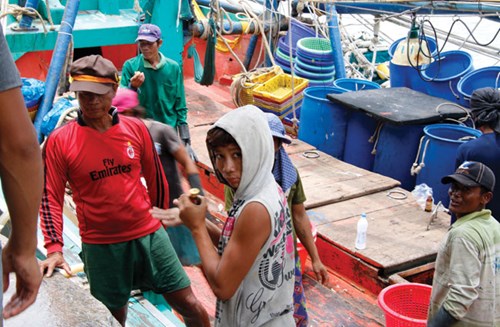Dhanin Chearavanont was CEO and Chairman of CP Group and steered the company through the crisis of dealing with slave labor on fishing boats feeding into its supply chain. In early 2017, Dhanin promoted his son Suphachai to the CEO position, and elder son, Soopakij, to Chairman. Dhanin himself continues in the role of Senior Chairman.
The company doesn’t own or operate fishing vessels, but independent boats are part of a supply chain that ultimately delivers product to its foods division, CP Foods. Many of the workers on these vessels are undocumented migrants from neighboring Myanmar and Cambodia – easy prey for human traffickers. Rescued individuals report that they were smuggled into the country in search of jobs, but in some cases they were instead treated as captives and sold directly on to fishing boats for as little as $400. Others were charged exorbitant fees for the promise of a well-paid job but forfeit their entire salary, sometimes for years on end, to pay the “debt.”
Once onboard, often miles offshore and in international waters, workers rescued by NGOs reported hauling nets and sorting fish sometimes over 20 hours a day. Trapped at sea – sold from one boat to another, sometimes for years – some even turned to suicide.
One man, who had been a monk in Cambodia before being sold into slavery, was freed by a local charity for roughly $550. He spoke on camera to rescuers: “I thought I was going to die,” he said, in the video. “He [the captain] kept me chained up. He didn’t care if I had any food. He didn’t care about anything. He kept me outside in the wind and rain. All the other fishermen had been sold, like me. We were treated like animals. But we’re human beings.”
“Human trafficking is a global problem,” CP Group CEO Suphachai Chearavanont says. “One company isn’t going to solve that. But what we were seeing was a concentration of human rights abuses in the Gulf of Thailand – that’s a problem that we could try to help solve.”
Thailand is one of the world’s largest shrimp producers, with hundreds of land-based farms producing about 300,000 tons in 2016. This makes the country a huge consumer of shrimp feed. Shrimp need protein. To make the feed, shrimp farmers buy fishmeal made from dried powdered fish, either from the trimmings from the canning of fish, or from “bycatch” – small fish caught alongside high-value species that can’t otherwise be sold.
Historically, it has been almost impossible to know the source and type of fish that has gone into the fishmeal and eventually into the shrimp feed. Journalists from The Guardian, in partnership with the Environmental Justice Foundation (EJF), followed trucks of bycatch from ports and boats where they knew trafficking and indentured labor were an issue, to a fishmeal plant – and from there they followed them to the gates of a shrimp feed mill, one of whose customers was CP Group.

A coalition convened by CP Group has worked to eliminate the practice offorced labor, which was widespread on fishingboats in the Gulf of Thailand. Sold from one boat to another, some workers didn’t return to land for years at a time

